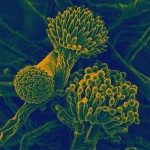Link to Pubmed [PMID] – 29842944
Semin. Cell Dev. Biol. 2018 May;
The binary classification of mammalian immune memory is now obsolete. Innate immune cells carry memory characteristics. The overall capacity of innate immune cells to remember and alter their responses is referred as innate immune memory and the induction of a non-specific memory resulting in an enhanced immune status is termed “trained immunity”. Historically, trained immunity was first described as triggered by the human fungal pathogen Candida albicans. Since, numerous studies have accumulated and deciphered the main characteristics of trained immunity mediated by fungi and fungal components. This review aims at presenting the newly described aspect of memory in innate immunity with an emphasis on the historically fungal mediated one, covering the known molecular mechanisms associated with training. In addition, the review uncovers the numerous non-specific effect that β-glucans trigger in the context of infectious diseases and septicaemia, inflammatory diseases and cancer.

